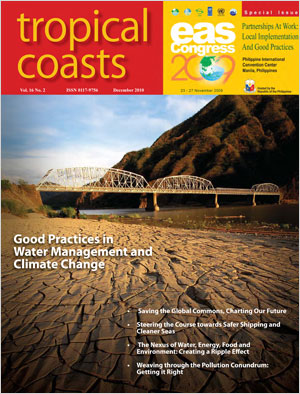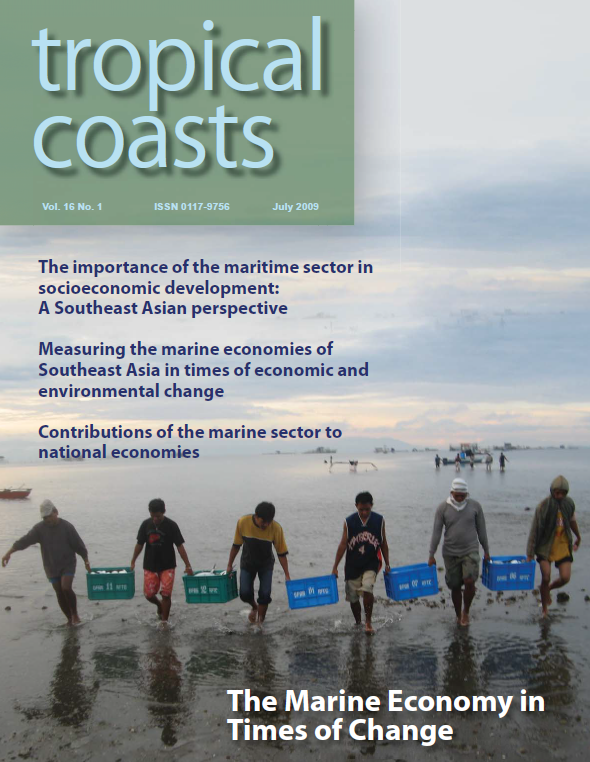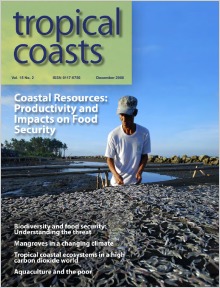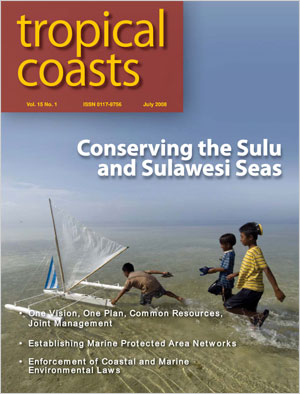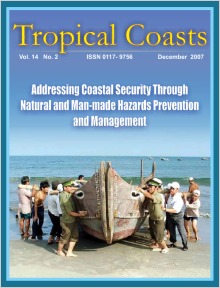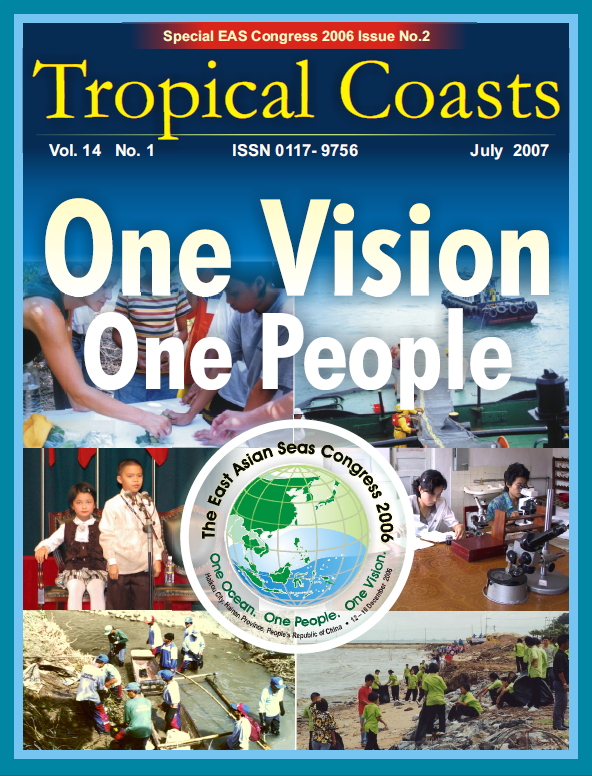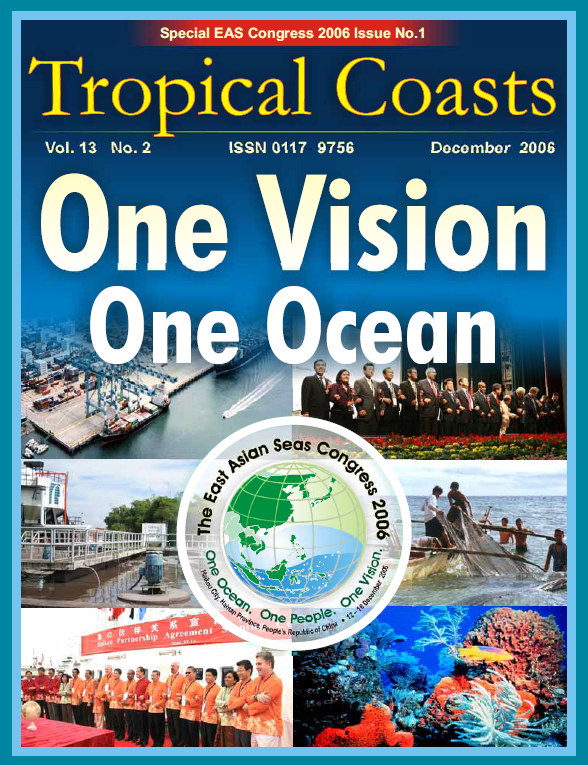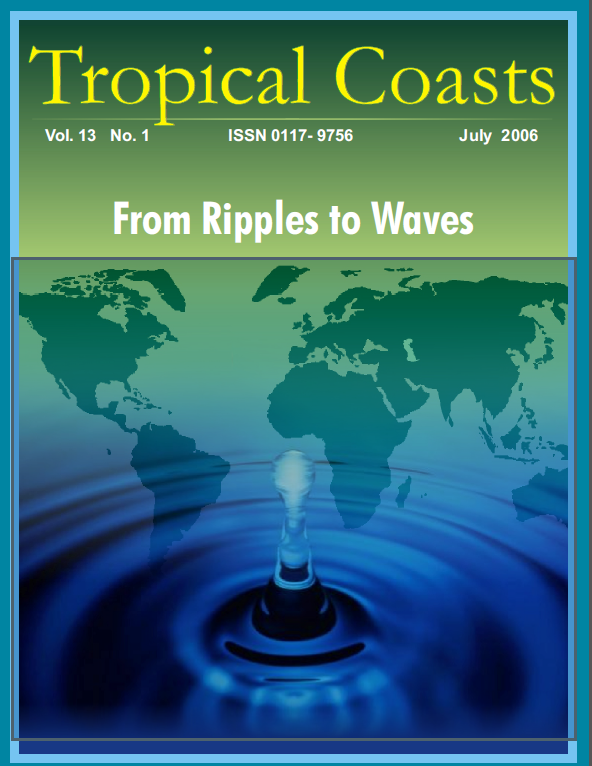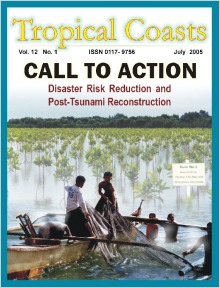
Breadcrumb
-
Good Practices in Water Management and Climate Change
The third triennial EAS Congress, hosted by the Government of the Philippines and co-organized by the Philippines Department of Environment and Natural Resources, attracted 1,480 participants, 100 exhibitors, 51 co-conveners and supporting organizations, and 12 sponsors. Good practices covering three water-related issues were explored during the course of the International Conference, namely: (a) prevention of marine pollution from sea-based activities; (b) water use and management for food supply, energy production and ecosystem services; and (c) innovative approaches and practices in freshwater/marine water management, including pollution reduction.
-
The Marine Economy in Times of Change
This issue of Tropical Coasts presents the initial results of the economic contribution of the ocean to the countries of the region. Why is this important? As explained by McIlgorm, by identifying the economic contribution of the ocean sector, policymakers can be more aware of how external events, such as climate change, sea level rise, degradation and destruction of natural resources and pollution impact on economic growth and prosperity. For example, inundation of coastal areas by seawater may have a high economic impact, well beyond the value of the land that is lost. Some coastal areas can be surrendered at low cost, while others will have major infrastructures and facilities that are vital to local, regional and national economies, and must be defended.
-
Coastal Resources: Productivity and Impacts on Food Security
This issue of Tropical Coasts is a joint effort of PEMSEA and the ASEAN Centre for Biodiversity. This issue takes a look at the linkages between biodiversity and food security, and some of the issues and activities that are being pursued in the region and elsewhere. In sum, this issue of Tropical Coasts emphasizes that the “teaching a man to fish” proverb is still relevant. What has changed over time is the context of the philosophy, where the emphasis has shifted from fishing to teaching, learning and living with the indisputable connection between biodiversity and food security.
-
Conserving the Sulu and Sulawesi Seas
This issue of Tropical Coasts focuses on an LME within the Seas of East Asia, the Sulu and Sulawesi Seas, which is in the process of developing and implementing a tri-national partnership arrangement. The Sulu and Sulawesi Seas, also known as the Sulu-Celebes Sea, have been identified as a distinct LME, ecoregion, and seascape by the United States National Oceanic and Atmospheric Administration (US NOAA), World Wide Fund for Nature (WWF), and Conservation International (CI), respectively. This issue of Tropical Coasts is a joint effort of PEMSEA and Conservation International-Philippines, a non-Country Partner of PEMSEA, as well as contributions from the Tri-National Secretariat for the ECP, (i.e., Malaysia Department of Fisheries – Sabah). It features articles on the SSME covering the development of the ECP, the supporting management framework and governance arrangements, financing and partnerships mechanisms, and enforcement initiatives. A prognosis on future initiatives planned for this large marine ecosystem is also featured.
-
Addressing Coastal Security through Natural and Man-made Hazards Prevention and Management
This issue of Tropical Coasts highlights how a gathering of local government executives bounded by the common mission of "serving as a network of local governments in East Asia, which, along with their stakeholders, shall promote the application of ICM as an effective management framework to achieve sustainable coastal development," can become an indispensable mechanism for knowledge validation, transfer and replication. The 2007 Forum of the PEMSEA Network of Local Governments for Sustainable Coastal Development (PNLG)* held in Danang, Vietnam, on 5–7 September 2007 focused on the theme "Addressing Coastal Security by Investing in Natural and Man-made Hazards Prevention and Management." The forum provided a venue for facilitating the exchange of information and experiences in DRR among local governments, national agencies, partner organizations, civil society groups and the private sector. It also provided a platform for the ICM sites to discuss how institutional strengthening in the context of DRR can be achieved and identify innovative solutions and opportunities to implement DRR options based on specific risk context and circumstances of the respective sites.
-
One Vision, One People
Continuing from the previous issue of Tropical Coasts, this issue explores the myriad of experiences in managing coastal and marine resources under an ever changing environment. It looks at the complex process of community engagement – from capacity development to providing the necessary technical and scientific support and the role of various institutions in the "make or break" process of coastal and marine development and management. This issue looks back at the three themes — Communities in Sustainable Development; Ecosystem-based Management: From River Basins to Coastal Seas; and Applying Management-related Science and Technology – and explore how numerous approaches and tools are utilized to engage different stakeholders in the process of coastal management. Like most management interventions, the underlying question is "how do we remove, or at least deal with, the barriers to motivating people to participate in the sustainable development of coastal and marine resources, considering that incentives may not directly translate to immediate and observable gains?"
-
One Vision, One Ocean
This issue of Tropical Coasts considers some of the scenarios being devised and/or implemented in East Asia, and in other regions, as possible solutions to the stresses that are building up in the region's natural infrastructure. Participants to the East Asian Seas (EAS) Congress 2006 considered these matters, and others, within the context of improved paradigms for coastal and ocean governance. The setting for the EAS Congress could not have been more appropriate — the beautiful and bustling coastal city of Haikou, Hainan Province, PR China. More than 800 people from 36 countries attended the five–day event, from 12–16 December 2006, graciously hosted by China's State Oceanic Administration, the Hainan Provincial Government, and the Haikou City Government, and co-organized and sponsored by 45 partner organizations. In this issue, four of the seven themes of the International Conference on Coastal and Ocean Governance: One Ocean, One People, One Vision are reviewed, namely: Securing the Oceans; Safer Shipping and Cleaner Oceans; Certifying Sustainability; and Local Government Financing for Water, Sewage and Sanitation.
-
From Ripples to Waves
This issue is a review of experiences and approaches used thus far to manage shared marine resources in different parts of the world, as well as the developments and new initiatives related to coastal and ocean governance at the regional level. It aims to offer some insights on the elements of successful regional cooperation and on the future directions of the regional ocean governance, thereby supporting the work of the Nippon Foundation Research Task Force on the Dynamics of Regional Cooperation on Oceans and Coasts. The Regional Task Force is composed of experts and heads of organizations that have endeavored to support the strengthened implementation of programmes/initiatives related to ocean governance through the integration of information on good practices and the distillation of basic principles for achieving regional collaboration since 2004.
-
Call to Action: Disaster Risk Reduction and Post-Tsunami Reconstruction
This issue of the Tropical Coasts adds another layer to the vast and instructive documents and case studies that have since been published regarding natural hazard and disaster management. Albeit very limited in scope, this issue aims to target the coastal management practitioners, who may have inadvertently missed out on the relevance and importance of integrating 'natural hazard thinking' to integrated coastal management (ICM). The articles are grouped into four sections. Towards Integrated Disaster Risk Reduction Strategies showcases the articulation of the culture of prevention, safety and mitigation that underpin the goals of the overarching sustainable development principles. Such are envisioned to decrease vulnerabilities, hence increasing the communities' resilience, to disasters and to create a “safer world for all” (Kelman and Abramovitz). Narcise's article underscores the role of the ICM process and framework in integrating hazard management to development planning and coastal management. She opines that there is no need to reinvent the wheel as the "implementation arrangements, processes, tools and applications are already in place and could be expanded to support hazard management considerations." On Post-Tsunami Reconstruction articulates several dimensions of the process of instituting strategies that must encompass not only reconstructing infrastructure but also ensuring protection of biodiversity and rebuilding sustainable livelihoods as well. Datta and Adriaanse, Llewellyn, et al., and Manuta, et al. highlight the principles and the wide-ranging scope and breadth to reconstruct human dignity in the aftermath of the tsunami.
